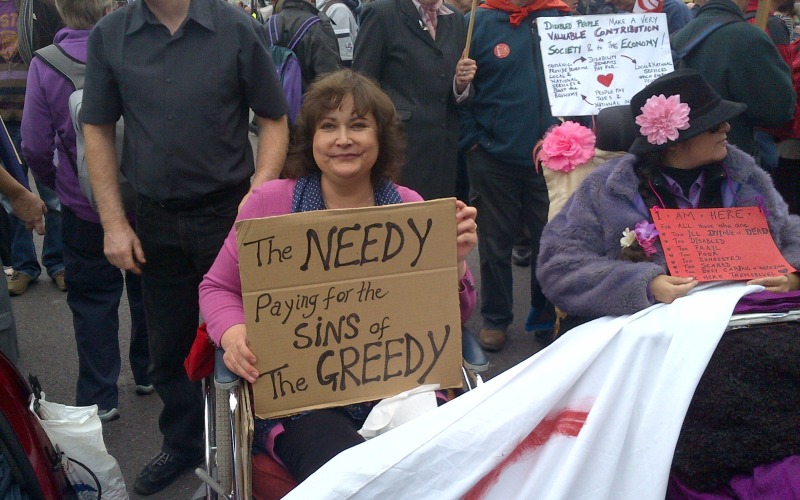The proportion of disabled people living in poverty rose sharply in the fourth year of the coalition government, according to official figures.
Disabled campaigners say the rise was an inevitable consequence of a string of cuts to disabled people’s support under the coalition government.
It is one of the first pieces of evidence to suggest the overall impact of the government’s reforms and cuts to disability benefits and services.
The figures show that – after housing costs are taken into account – the percentage of people living in households where at least one member was disabled who were in “absolute poverty” rose from 27 per cent in 2012-13 to 30 per cent in 2013-14 an increase of about 10 per cent in just one year.
And they show that the number of people in “disabled households” who were living in absolute poverty rose by 300, 000 in that one year.
Once income received through disability living allowance, attendance allowance and personal independence payment is excluded – as income from these benefits is supposed to meet some of the extra costs of disability – the number of disabled people living in poverty will have risen even further.
The figures – taken from the annual Family Resources Survey, which is funded by the Department for Work and Pensions (DWP) – show that absolute poverty among households that did not include any disabled people fell over the same period.
Absolute poverty describes income that is so low that someone cannot meet their basic needs, even before their disability-related costs are taken into account.
Just days after the figures were published, the BBC reported that the government was considering introducing measures that would see a fresh attack on disabled people’s income and standard of living.
The BBC said DWP had been looking at plans to scrap part of the main out-of-work disability benefit, employment and support allowance (ESA), a step that would be certain to increase disability poverty.
The BBC says that a leaked DWP document describes ESA as a “passive” benefit which does not “incentivise” people to find a job, and suggests scrapping the ESA work-related activity group (WRAG).
This would mean that disabled ESA claimants expected to move eventually into work – but not yet “fit for work” – would see their weekly payments fall from £102.15 to £73.10, the same amount as those claiming jobseeker’s allowance.
The Family Resources survey results also show that the proportion of disabled people living in relative poverty – those who are poor in comparison with the general population – increased in 2013-14 by two percentage points (about 300,000 people), while relative poverty among non-disabled people stayed roughly at the same level.
Crucially, the percentage rises in relative and absolute poverty are both statistically significant, which means that the increases are highly unlikely to be purely due to chance, and suggest that the poverty gap between non-disabled and disabled people widened under the coalition during its fourth year.
The DWP press release on the poverty statistics fails to mention these post-housing costs increases in disability poverty.
The before-housing costs figures also show a slight increase in relative poverty among disabled people, with the proportion of those in absolute poverty staying roughly the same, at a time when both relative and absolute poverty among non-disabled people was falling, although none of these results were statistically significant.
It is the first time that it has been possible to calculate annual changes in disability poverty since 2013, because last year DWP changed the way the figures were drawn up.
Michelle Maher, from the WOWcampaign, said it was “no surprise” that the number of disabled people in poverty had risen so sharply, following policies such as cuts to ESA, rises in council tax, the introduction of the bedroom tax, cuts to disability living allowance (DLA), disabled people paying for their care from their DLA or personal independence payment, and the restrictions and freezing of the annual uprating of benefits.
She said: “The eighth of July [the budget] now hangs over our heads like the Sword of Damocles and the Tory party have no intention of doing a cumulative impact assessment (CIA) of all the cuts to disabled people.
“They have ignored a recent call from the Equality and Human Rights Commission and the work and pensions select committee, who requested a CIA before more cuts are implemented, but sadly as we all know they wouldn’t want the figure in the public domain, as they chase their ideological-driven agenda.”
Maher said the fact that the media and government had ignored the rise in poverty among disabled people suggested that the cuts to come at this week’s budget would again hit disabled people.
She said: “The Tory party’s favourite new word is ‘scaremongering’ by disabled people, but the only ones who are doing the scaring are the Tory ministers who have refused for months to deny further cuts to carers and disabled people.”
DWP refused to comment on the increase in disability poverty.

 ‘Disastrous’ cuts bill that leaves legacy of distrust and distress ‘must be dropped’
‘Disastrous’ cuts bill that leaves legacy of distrust and distress ‘must be dropped’ Silence from MP sister of Rachel Reeves over suicide linked to PIP flaws, just as government was seeking cuts
Silence from MP sister of Rachel Reeves over suicide linked to PIP flaws, just as government was seeking cuts Disabled activists warn Labour MPs who vote for cuts: ‘The gloves will be off’
Disabled activists warn Labour MPs who vote for cuts: ‘The gloves will be off’